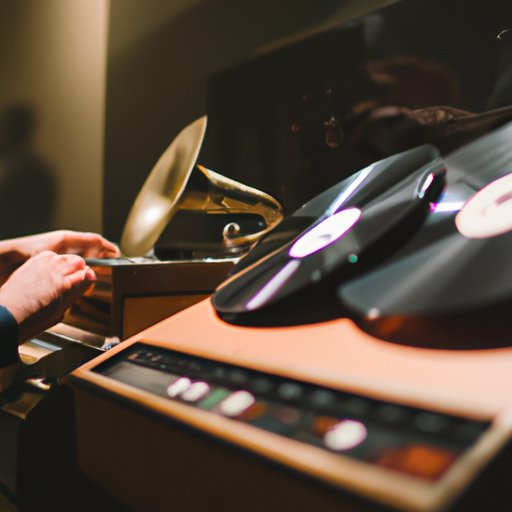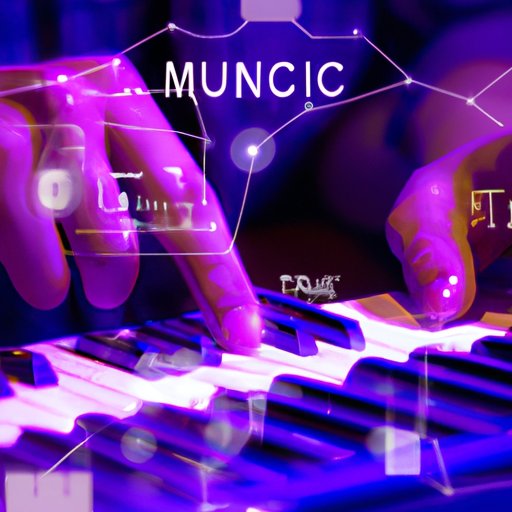Introduction
Music technology is an umbrella term that encompasses a wide range of tools and techniques used to create, record, mix, and produce music. It includes hardware like controllers and synthesizers, software such as audio production and mixing tools, and even mobile apps for creating and sharing music. In recent years, music technology has become an integral part of the music industry, transforming the way music is created, shared, and consumed.

Exploring the History and Evolution of Music Technology
The history of music technology dates back centuries, with some of the earliest forms of music technology stemming from musical instruments such as the pipe organ, which was invented in the 3rd century BC. The invention of the phonograph in 1877 marked a major turning point in the history of music technology, as it allowed music to be recorded and played back for the first time. This paved the way for the development of more sophisticated recording and playback technologies such as reel-to-reel tape recorders, cassette players, and CD players.
The mid-1980s saw the emergence of digital audio technology, which enabled musicians to record and manipulate sound with greater accuracy and precision. This ushered in a new era of music technology, known as the “digital revolution”. This period saw the introduction of digital audio workstations (DAWs), which allowed users to record, edit, and mix audio with a computer. It also saw the emergence of MIDI (Musical Instrument Digital Interface) technology, which allowed computers and electronic instruments to interact with each other.
In recent years, the advancement of music technology has continued at a rapid pace. Today, there are a wide variety of tools and technologies available to musicians, including virtual instruments, audio processors, and cloud-based services. This has enabled musicians to create and share music more easily than ever before.
Benefits of Music Technology for Musicians
The use of music technology provides a number of benefits for musicians. By using digital tools, musicians are able to increase their creativity by experimenting with different sounds and effects. Additionally, music technology can improve the overall sound quality of a track, allowing musicians to achieve a professional-sounding result without having to invest in expensive equipment.
Another benefit of music technology is that it makes collaboration easier. Many digital tools allow multiple people to work on a track at the same time, enabling them to create music together regardless of location. This has made it possible for musicians from around the world to collaborate on projects, something that would have been impossible just a few decades ago.

Different Types of Music Technology
There are many different types of music technology available today, ranging from hardware devices to software programs. Some of the most popular types of music technology include audio software, MIDI controllers, loopers, and synthesizers.
Audio software is a type of music technology used for recording and mixing audio. Popular examples of audio software include Pro Tools, Logic Pro, and Ableton Live. MIDI controllers are devices that allow musicians to control software instruments and other digital elements. Loopers are devices that enable musicians to record and play back loops of audio. Synthesizers are electronic instruments used to create and manipulate sound.
Common Uses and Applications of Music Technology
Music technology can be used for a variety of purposes, from recording and mixing to performance and live music. Recording and mixing are two of the most common applications of music technology. Recording involves capturing audio and storing it in a digital format, while mixing involves combining multiple tracks and adjusting their levels and effects.
Performance and live music are also popular uses of music technology. Performing with digital instruments and tools allows musicians to create unique and engaging live performances. Additionally, music technology can be used for music production, which involves creating instrumental tracks, beats, and soundscapes.

How Music Technology is Changing the Music Industry
The rise of music technology has had a profound impact on the music industry. According to a study by Statista, the global music streaming market was worth US$20.8 billion in 2019, and is expected to reach US$28.7 billion by 2024. This has had a significant effect on how musicians monetize their music, as streaming services provide artists with a platform to reach a wider audience and generate income from their work.
Social media has also had a major impact on the music industry, as it provides musicians with a platform to promote and share their music with fans. Additionally, music technology has opened up new opportunities for independent musicians, who are now able to produce and release their music without relying on major labels.
Conclusion
Music technology has revolutionized the music industry, transforming the way music is created, shared, and consumed. From early forms of music technology such as the pipe organ to modern digital tools, music technology has enabled musicians to express themselves in new and exciting ways. Additionally, music technology has opened up new opportunities for independent musicians, providing them with a platform to reach a wider audience and generate income from their work.
In conclusion, music technology has had a huge impact on the music industry, and will continue to shape the way music is created and consumed in the future.
(Note: Is this article not meeting your expectations? Do you have knowledge or insights to share? Unlock new opportunities and expand your reach by joining our authors team. Click Registration to join us and share your expertise with our readers.)
